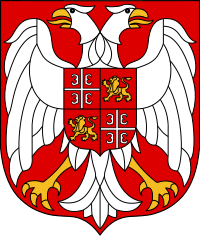Foreign relations of Serbia and Montenegro
Since the breakup of the Socialist Federal Republic of Yugoslavia in the early 1990s, the foreign policy of the Federal Republic of Yugoslavia (renamed Serbia and Montenegro in 2003) was characterized primarily by a desire to secure its political and geopolitical position and the solidarity of ethnic Serbs in the Balkan region through a strong nationalist campaign. Since October 2000, the country has worked to stabilize and strengthen its bilateral relationships with neighboring countries. In spring and summer 2002, Yugoslavia resolved its longstanding border dispute with Republic of Macedonia and established full diplomatic relations with its neighbor and former adversary Croatia. Although a difficult political issue domestically, Serbia has established a solid working relationship with UNMIK and has released all disputed ethnic Albanian prisoners from Kosovo to the competent UN bodies.
 |
|---|
| This article is part of a series on the politics and government of Serbia and Montenegro |
|
Constitution |
| Foreign relations |
|
Related topics
|
In 2002, the government established a commission to coordinate cooperation with the International Criminal Tribunal for the former Yugoslavia (ICTY) and began serving warrants for the arrest of indicted war criminals who have sought refuge in the country. The crackdown on organized crime following the assassination of Serbian Prime Minister Zoran Đinđić; also resulted in the apprehension and transfer to the International Criminal Tribunal for the former Yugoslavia in Hague of several persons indicted for war crimes.
Immediately preceding the NATO bombing campaign of the Federal Republic of Yugoslavia in spring 1999, the U.S. and most European countries severed relations with Yugoslavia, and the U.S. embassy was closed. Since October 5, 2000, foreign embassies, including that of the U.S., have reopened, and the country has regained its seat in such international organizations as the Organization for Security and Co-operation in Europe (OSCE) and the United Nations and is actively participating in International Monetary Fund (IMF) and World Bank projects. As of summer 2003, Serbia and Montenegro has been admitted to the Council of Europe and has indicated that it wishes to join NATO's Partnership for Peace.
Foreign aid
Subsequent to the outbreak of hostilities with NATO, Belgrade received no foreign aid from the United States and other west European countries, but has received much aid from other countries such as Russia, China, and Greece. Since October 2000, however, the European Union aid has steadily increased, and U.S. restrictions on aid have fallen away as the union of Serbia and Montenegro stepped forward to meet its international obligations. In June 2003, U.S. Secretary of State Colin Powell was able to certify that Serbia and Montenegro relationship with the Republika Srpska was consistent with the Dayton Accords, had released all political prisoners, and was cooperating with ICTY. As a result, the United States is now free to release aid money and support Serbia and Montenegro in international financial institutions, such as the IMF and World Bank. Total U.S. aid to Serbia and Montenegro, including debt forgiveness, exceeded $180 million in fiscal year 2002. The U.S. is the single-largest donor of aid to Serbia and Montenegro.
International disputes
- Several Albanian political parties in Kosovo voice union with Albania
- Has delimited about half of the boundary with Bosnia and Herzegovina, but sections along the Drina River remain in dispute.
- There is also a dispute with Bosnia regarding the exclave of Sastavci village in Priboj municipality (which is entirely surrounded by Serbian territory), as well as Serbian "practical" exclave comprising several villages in the same area.
- Some disputes with Croatia regarding the border. In 2002 there was a border incident regarding river island near Šarengrad, when Serbian border police prevented land owners from Croatia to visit their properties (lying in Serbian territory) using boats.
- In late 2002, Serbia and Montenegro and Croatia adopted an interim agreement to settle the disputed Prevlaka Peninsula, allowing the withdrawal of the UN monitoring mission (UNMOP), but discussions could be complicated by the inability of Serbia and Montenegro to come to an agreement on the economic aspects of the new federal union.
- After a recent shooting of an Albanian youth crossing the border with Macedonia there has been calls for autonomy for Albanians in the Presevo region, having international troops put as borderguards, and making of more border crossings.
Illicit drugs
- Transshipment point for Southwest Asian heroin moving to Western Europe on the Balkan route; economy vulnerable to money laundering